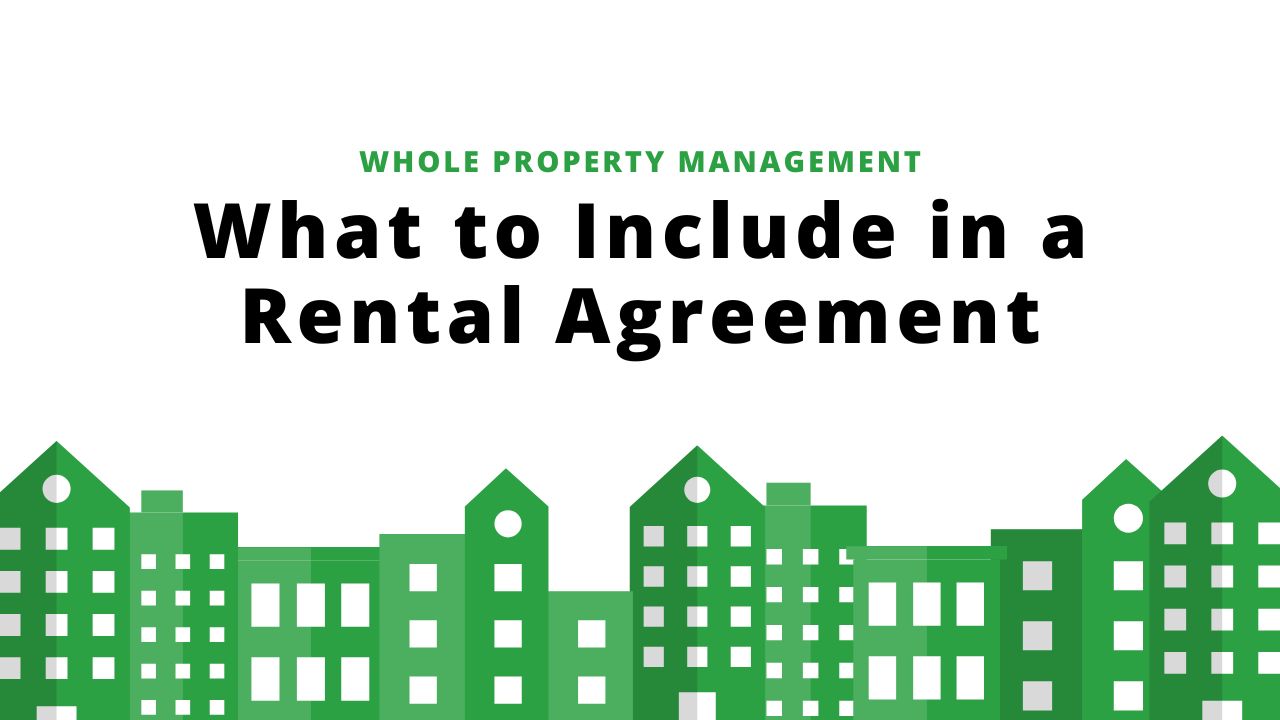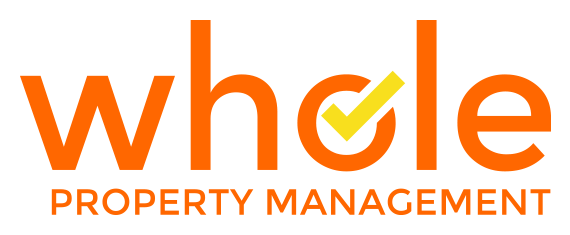What to Include in a Rental Agreement

Is your rental agreement built to safeguard your investment and minimize disputes? As a landlord, your agreement isn’t just a piece of paper—it’s your first line of defense against misunderstandings, late payments, property damage, and legal headaches.
A well-structured rental agreement sets clear expectations for both you and your residents, ensuring smooth tenancy and financial security. But what exactly should you include to safeguard your interests while keeping the agreement fair and enforceable?
In this guide, from Whole Property Management, we’ll break down the essential elements every rental agreement must have, so you can confidently draft a contract that minimizes risks and keeps your rental business running efficiently.
What Every Rental Agreement Should Include
A well-crafted rental agreement sets the foundation for a smooth landlord-tenant relationship by clearly outlining rights, responsibilities, and expectations.
1. Names of All Parties Involved
Your rental agreement must clearly state the full legal names of everyone involved. This includes you (the landlord) and all adult residents living in the rental. This is important because if an issue arises—like unpaid rent or property damage—you need to know exactly who is legally responsible.
If only one person signs but others live there, you might have trouble enforcing the agreement. Simply put, listing every resident ensures accountability and prevents legal loopholes down the road.
2. Property Details and Lease Term
Be specific about what’s being rented. Your lease should include the full rental property address and any included features (like a parking space or storage unit). Next, define the agreement term—how long the agreement lasts.

Is it a month-to-month lease, offering flexibility, or a fixed-term (like 12 months), providing stability? Both have pros and cons, but clarity here avoids confusion. Also, don’t forget to include what happens when the lease ends.
3. Rent Payment Terms
Getting paid on time is crucial for your rental business. Your agreement should clearly state:
- How much rent is due each month
- When it’s due (e.g., the 1st of the month)
- How rent should be paid (bank transfer, check, online, etc.)
- What happens if it’s late (late fees, grace periods, etc.)
Many disputes arise from payment issues, so leaving no room for confusion protects you. If you charge late fees, be reasonable but firm—this encourages on-time payments and keeps cash flow steady.
4. Security Deposit and Fees
The security deposit is your safety net against damages and unpaid rent, but mishandling it can cause legal trouble. Your rental agreement should outline:
- How much the deposit is
- What it covers (damage beyond normal wear and tear, unpaid bills, etc.)
- How and when it will be returned after move-out
Be clear about deductions, transparency here prevents disputes and keeps everything fair for both parties.
5. Rules and Responsibilities
One of the best ways to prevent problems is by setting clear ground rules from the get-go. Your rental agreement should explain what residents are responsible for, like maintaining the property and keeping it clean.

This can include things like mowing the lawn, taking out the trash, and making sure common areas are tidy. You should also include rules on noise levels and behavior—especially if you’re renting a unit in a building where noise complaints could be an issue.
If you’re okay with residents having guests or pets, be sure to mention any guest policies and pet rules (like breed restrictions or additional pet fees). Setting these expectations upfront makes it easier to resolve any conflicts later on.
6. Policies on Late Payments and Evictions
Everyone hopes it doesn’t come to this, but sometimes residents fall behind on rent or break the lease. Your rental agreement should make it clear what happens in these situations.
Start by defining what happens if the rent is late—how many days before a late fee is charged, and how much it will be. Make sure to mention if there is a grace period, which gives residents a little extra time without penalty.
As for tenant evictions, include the process you’ll follow if a resident repeatedly violates the agreement. Be specific: how much notice do you give them? What steps will you take to handle the situation? Being upfront about these policies helps prevent misunderstandings and protects your rights as a landlord.
7. Maintenance and Repair Obligations
Maintaining the property is a shared responsibility between you and the resident. Your agreement should outline who handles what. For example, residents should know they are responsible for basic upkeep, like changing light bulbs, cleaning the gutters, or replacing air filters.

However, you, as the landlord, are usually responsible for major repairs—like fixing a broken refrigerator or dealing with plumbing issues. Be sure to specify what happens if something breaks. A well-detailed repair policy ensures that residents aren’t left in the lurch when something goes wrong, and you can stay on top of any necessary repairs.
8. Legal Disclosures and Addendums
Certain legal disclosures may be required by state law, and you must include these in the rental agreement. These could include information about the presence of lead-based paint in homes built before 1978, mold risks, or details about property safety features (like smoke detectors or carbon monoxide alarms).
If your property has any specific rules or conditions not already covered in the lease agreement, consider adding addendums. These might include anything from a pet agreement (if you allow animals) to rules about smoking or parking.
Legal disclosures and addendums ensure that everything is in order and helps protect both you and your residents from any future legal issues.
The Bottom Line
Creating a clear, comprehensive rental agreement is essential to protecting your property and fostering positive relationships with your residents. Whole Property Management can guide you through drafting the perfect rental agreement tailored to your needs.
Whether you need help with legal requirements, maintenance clauses, or setting fair policies, their expertise ensures your rental agreements are rock-solid. Reach out to us today to discuss your options and find the best solutions for your rental business!
